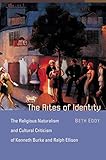The Rites of Identity : The Religious Naturalism and Cultural Criticism of Kenneth Burke and Ralph Ellison / Beth Eddy.
Material type: TextPublisher: Princeton, NJ : Princeton University Press, [2009]Copyright date: ©2004Edition: Course BookDescription: 1 online resourceContent type:
TextPublisher: Princeton, NJ : Princeton University Press, [2009]Copyright date: ©2004Edition: Course BookDescription: 1 online resourceContent type: - 9780691092492
- 9781400825769
- 818/.5209 21
- PN75.B8 E34 2003
- online - DeGruyter
- Issued also in print.
| Item type | Current library | Call number | URL | Status | Notes | Barcode | |
|---|---|---|---|---|---|---|---|
 eBook
eBook
|
Biblioteca "Angelicum" Pont. Univ. S.Tommaso d'Aquino Nuvola online | online - DeGruyter (Browse shelf(Opens below)) | Online access | Not for loan (Accesso limitato) | Accesso per gli utenti autorizzati / Access for authorized users | (dgr)9781400825769 |
Frontmatter -- CONTENTS -- Acknowledgments -- CHAPTER ONE. Identity and the Rites of Symbolic Action -- CHAPTER TWO. Kenneth Burke's Natural Pieties of Identity -- CHAPTER THREE. Catharsis and Tragedy: Kenneth Burke's Rhetoric of Sacrifice -- CHAPTER FOUR. The Spiritual Utility of Comedy -- CHAPTER FIVE. Ralph Ellison and the Vernacular Pieties of American Identity -- CHAPTER SIX. Ellison's Tragic Vision of Sacrifice -- CHAPTER SEVEN. The Blues of American Identity: Comic Transcendence in Ellison -- CHAPTER EIGHT. Both a Part of and Apart From: The Spirit and Ethics of a Religious Pragmatism -- Notes -- Bibliography -- Index
restricted access online access with authorization star
http://purl.org/coar/access_right/c_16ec
The Rites of Identity argues that Kenneth Burke was the most deciding influence on Ralph Ellison's writings, that Burke and Ellison are firmly situated within the American tradition of religious naturalism, and that this tradition--properly understood as religious--offers a highly useful means for considering contemporary identity and mitigating religious conflict. Beth Eddy adds Burke and Ellison to a tradition of religious naturalism that traces back to Ralph Waldo Emerson but received its most nuanced expression in the work of George Santayana. Through close readings of the essays and fiction of Burke and Ellison, Eddy shows the extent to which their cultural criticisms are intertwined. Both offer a naturalized understanding of piety, explore the psychological and social dynamics of scapegoating, and propose comic religious resources. And both explicitly connect these religious categories to identity, be it religious, racial, national, ethnic, or gendered. Eddy--arguing that the most socially damaging uses of religious language and ritual are connected to the best uses that such language has to offer--finds in Burke and Ellison ways to manage this precarious situation and to mitigate religious violence through wise use of performative symbolic action. By placing Burke and Ellison in a tradition of pragmatic thought, The Rites of Identity uncovers an antiessentialist approach to identity that serves the moral needs of a world that is constantly negotiating, performing, and ritualizing changes of identity.
Issued also in print.
Mode of access: Internet via World Wide Web.
In English.
Description based on online resource; title from PDF title page (publisher's Web site, viewed 08. Jul 2019)


